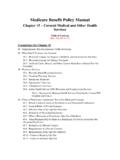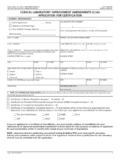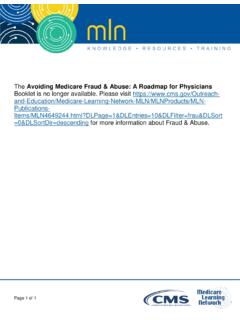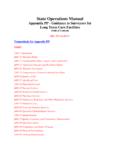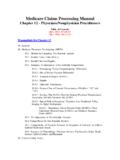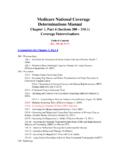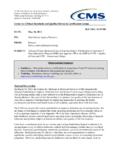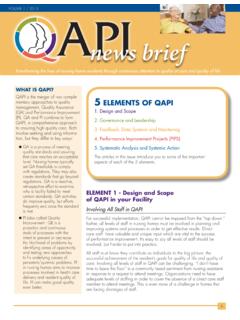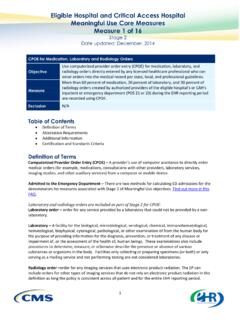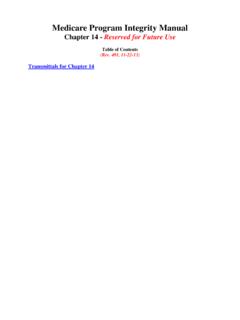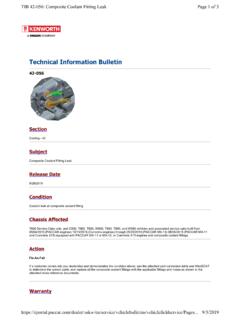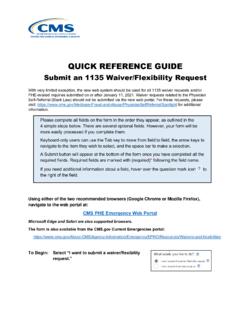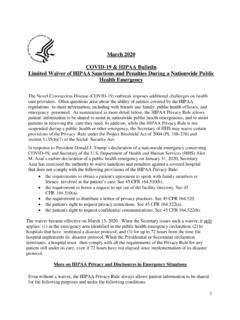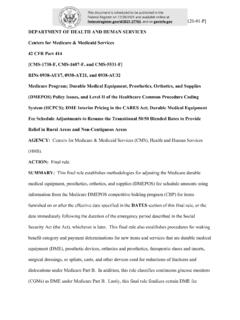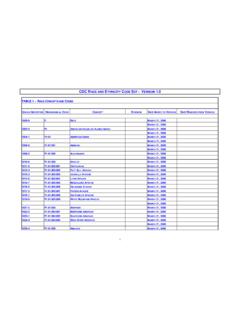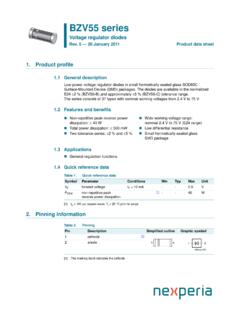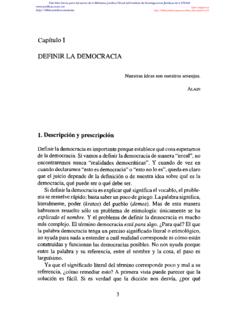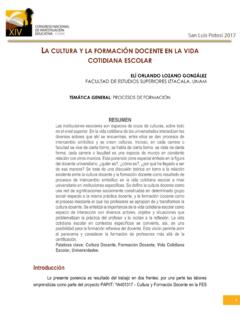Transcription of Centerfor ClinicalStandardsandQuality/Quality,Safety ...
1 DEPARTMENT OF HEALTH & HUMAN SERVICES Centers for Medicare & Medicaid Services 7500 Security Boulevard, Mail Stop C2-21-16 Baltimore, Maryland 21244-1850 CenterforClinicalStandardsandQuality/Qua lity,Safety& Oversight Group Ref: QSO-21-17-NH DATE: April 8, 2021 UPDATED:5/10/2021 TO: State Survey Agency Directors FROM: Director Quality, Safety & Oversight Group SUBJECT: Updates to Long-Term Care (LTC) Emergency Regulatory Waivers issued in response to COVID-19 Memorandum Summary CMS continues to review the need for existing waivers issued in response to the Public Health Emergency (PHE). Over the course of the PHE, nursing homes have developed policies or other practices that we believe mitigates the need for certain waivers.
2 Therefore, CMS is announcing it is ending: o The emergency blanket waivers related to notification of Resident Room orRoommate changes, and Transfer and Discharge notification requirements; o The emergency blanket waiver for certain care planning requirements forresidents transferred or discharged for cohorting purposes. o The emergency blanket waiver of the timeframe requirements for completingand transmitting resident assessment information (Minimum Data Set(MDS). CMS is providing clarification and recommendations for Nurse Aide Training and Competency Evaluation Programs (NATCEPs) Background In response to the 2019 Novel Coronavirus (COVID-19) PHE and under its authority at section 1135 of the Social Security Act, CMS enacted several temporary emergency blanket waivers which were intended to provide nursing homes with flexibility to respond to the COVID-19 pandemic1.)
3 This memo addresses the following emergency blanket waivers: Waiver of requirements related to the timing of notifying residents prior to transfer and discharge to enable facilities to expeditiously cohort residents to prevent the transmission of COVID-19 to uninfected residents. 1 Page 1 of 4 Waiver of requirements related to the timing of notifying residents of changes in rooms or roommates. Waiver of requirements related to the timing of completing certain care plans. Waiver of the timeframe requirements for completing and transmitting resident assessment information (minimum data set (MDS)) in order to allow facilities to focus on resident care.
4 Waiver of certain requirements related to nurse aides in training to mitigate potential staffing shortages by enabling facilities to employ nurse aides quickly and forextended periods of time. CMS has been monitoring these emergency blanket waivers through the course of the PHE, and is providing the following updates. Ending of Select Emergency Blanket Waivers During the COVID -19 PHE Emergency Blanket Waivers for Notifying Residents before Transfer or Discharge (42 CFR (c)(4)(ii)), or Room or Roommate Change (42 CFR (e)(6)) To help nursing homes take swift action to implement transmission based precautions and cohort residents who have been exposed or potentially exposed to COVID-19, CMS waived requirements to provide advance notice prior to transfers or discharges2, and prior to room or roommate Before enacting the emergency blanket waiver related to providing notice when transferring or discharging residents, facilities were required to provide notice of the transfer or discharge to the resident/representative 30 days in advance, or as soon as practicable prior to the transfer or discharge.
5 Likewise, before the emergency blanket waiver related to notice before room changes, facilities were required to notify the resident prior to making a room or roommate change. These waivers allowed facilities to notify residents of a room change or transfer after the transfer has occurred, which helped facilities to swiftly transfer a resident to another unit or facility for cohorting purposes. CMS believes nursing homes have developed practices by now that have made them able to efficiently cohort residents and provide the required notice in advance. Therefore, facilities are now required to resume providing notice as required in the regulations: With 30 days advanced notice , or as soon as practicable before the transfer or discharge of a resident; and Before a room or roommate change.
6 Note: CMS is only ending the waivers at 42 CFR (e)(6) for providing written notice before a room/roommate change, and at 42 CFR (c)(4)(ii) for timing of notification of transfer or discharge. The related waivers, which continue to allow facilities to transfer or discharge, and change rooms for the sole purposes of cohorting remain in effect. Emergency Blanket Waiver for Care Planning Requirements ( (a)(1)(i), (a)(2)(i), and (b)(2)(i)). 2 CMS waived requirements at 42 CFR (c)(4)(ii) 3 CMS waived requirements at 42 CFR (e)(5), (6), and (7). Page 2 of 4 Federal regulations require that nursing home complete a baseline care plan within 48 hours of admission and a comprehensive care plan seven days after completing the comprehensive admission assessment.
7 To further help nursing homes take swift action to implement transmission based precautions and cohort residents who have been exposed or potentially exposed to COVID-19, CMS waived these requirements when transferring or discharging residents to another long-term care facility requirements for the certain cohorting purposes of admission, after a comprehensive MDS. Similar to rationale for ending other waivers, CMS believes that nursing homes should have developed processes for completing these important care planning tasks. As a result, CMS is ending the emergency blanket waiver for 42 CFR (a)(1)(i), (a)(2)(i), and (b)(2)(i). Emergency Blanket Waiver of Minimum Data Set (MDS) Timeframe Requirements (42 CFR ) CMS waived the MDS timeframe requirements at 42 CFR for assessments to allow providers flexibility in completing and transmitting assessments.
8 This action was intended to allow facilities to prioritize infection control efforts in response to the PHE. However, the majority of facilities have been completing and transmitting assessments timely, therefore we believe all providers should be able to complete and transmit MDS assessments as required at 42 CFR Also, CMS believes nursing homes should have developed practices for completing these assessments timely, which are critical for resident care planning. As a result, CMS is ending the emergency blanket waiver for 42 CFR Note: CMS is not ending the waiver at 42 CFR (k) related to the Pre-Admission Screening and Annual Resident Review (PASARR) at this time. Training and Certification of Nurse Aides (42 CFR (d)) To help nursing homes address staffing shortages during the pandemic, CMS provided a blanket waiver for the nurse aide training and certification requirements at 42 CFR (d) (except for requirements that the individual employed as a nurse aide be competent to provide nursing and nursing related services at 42 CFR (d)(1)(i)), specifically to permit nurse aides to work for longer than four months without having completed their training.
9 This waiver allows facilities to employ individuals beyond four months, in a nurse aide role even though they might have not completed a state approved Nurse Aide Training and Competency Evaluation Programs (NATCEP). The individual could continue to work as long as the nursing home ensured that the nurse aide could demonstrate competency in skills and techniques needed to care for residents. CMS is not ending the current nurse aide waiver. However, we are clarifying how federal regulations can be applied to nurse aides working under the blanket waiver, and help enable these individuals to become certified nurse aides (CNAs). Federal regulations at 42 CFR (a) and (b) require that NATCEP participants take 75 hours of training in certain areas that are critical for performing their role as a CNA, such as infection control, residents rights, and basic nursing skills.
10 While these federal requirements specify the topics and number of hours that the training must include, the federal requirements do not specify how the training must be delivered. For example, federal requirements do not specify whether the content must be delivered via classroom-style training versus in a nursing Page 3 of 4 home setting. CMS acknowledges that training on many of the topics stated in the federal requirements can be obtained in the nursing home setting through onsite observation and working as a nurse aide under the blanket waiver. Therefore, CMS recommends that states evaluate their NATCEP, and consider allowing some of the time worked by the nurse aides during the PHE to count towards the 75-hour training requirement.
